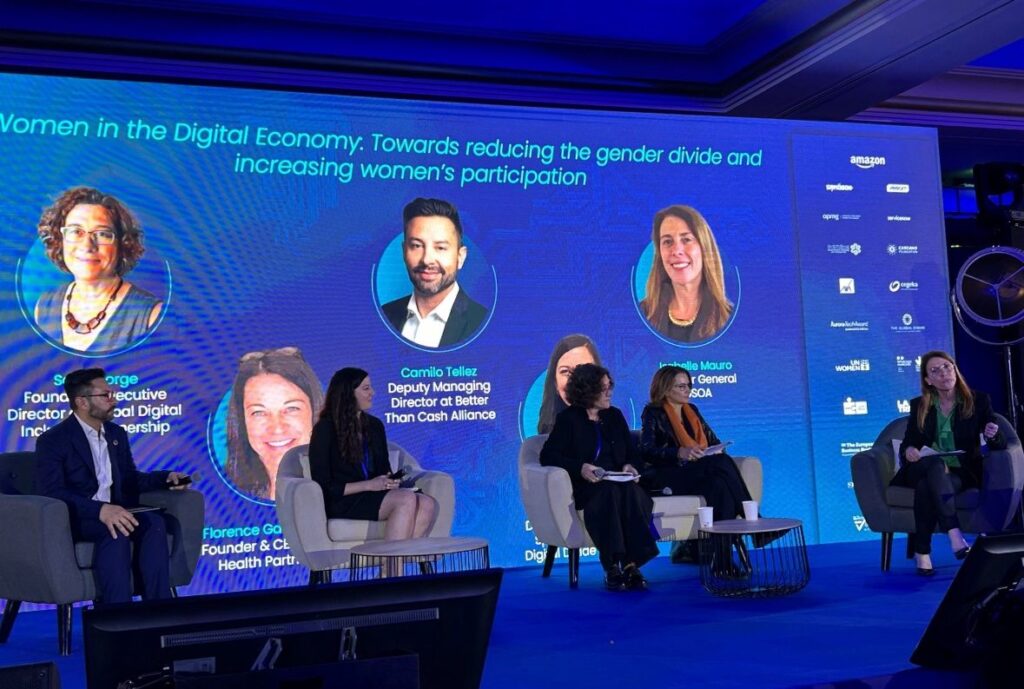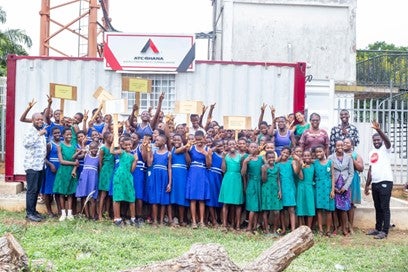Home Beyond Dialogue: Taking action against the gender digital divide
Reflecting on the perspectives and conversations surrounding women’s digital exclusion, we look ahead with optimism and a renewed sense of direction on the key areas and actions needed to close the gender digital divide.
After the Women in the Digital Economy Fund’s (WiDEF) highly anticipated launch and inaugural funding announcement, we find ourselves at a pivotal moment for reflection. In this blog, we share our observations from various events, panel discussions, and the broader dialogue surrounding the gender digital divide that WiDEF has engaged in since March 2024.
Since its launch, WiDEF has not only sparked crucial conversations about this pressing issue but has also highlighted the importance of gender-responsive, cross-sector, multi-stakeholder collaboration, and transformative policy implementation to spur women’s participation and inclusion in the digital economy. But the conversations must move beyond dialogue. As we edge closer to the Sustainable Development Goals (SDGs) 2030 agenda, the gender digital divide continues to detrimentally impact the lived experiences of women and girls globally, especially in low- and middle-income countries (LMICs).
Concerted efforts have been made by a multitude of actors to address the gender digital divide, yet despite the visible impact women play in inclusive digital innovation – the gender gap in mobile internet adoption stands at 31% in South Asia, and 32% in Sub-Saharan Africa contributing to the 785 million women who remain unconnected. (GSMA The Mobile Gender Gap Report 2024)
WiDEF is committed to highlighting and addressing the missed opportunity for more inclusive, localized, and scalable digital solutions in emerging markets.
It is estimated that low- and middle-income countries have missed over USD $1 trillion in GDP in the last decade as a result of women’s exclusion from the digital world, according to WiDEF implementation partner, Global Digital Inclusion Partnership’s (GDIP) 2024 Connected Resilience report. This translates to nearly double the annual GDP rate of Nigeria, Africa’s second-largest economy. For smaller and lower-income countries this potential growth presents unparalleled opportunities for sustainable development. Digitalization and the development of more sophisticated emerging technologies evolving at lightning speed mean that this figure will only multiply. WiDEF seeks to ensure that women in LMICs are a part of this fast-paced technological evolution.
Earlier this year, the Women in Tech® Global Summit held in Paris provided a snapshot of the untapped potential of women’s contributions in designing high-impact digital solutions that improve women’s well-being. “From non-invasive biomedical solutions in women’s health to a new era for generative AI, women in tech are leading the charge in AI development. As digitalization and emerging technologies continue to evolve it is vital that women from LMICs are not left behind and can play a role at every level of this movement.” says GDIP Executive Director Sonia Jorge

Implementing partner Global Digital Inclusion Partnerships, Executive Director, Sonia Jorge joins panellists Camilo Tellez (UN Better Than Cash), Lauren Grubbs (USAID), Isabelle Mauro (Women in Tech) & Florence Gaudry-Perkins (Digital Health Partnerships) at the Women in Tech event in Paris.
What actions are being taken to close the gender digital divide?
Addressing the gender digital divide is only possible through a comprehensive approach backed by intentional action and scalable solutions. This is the approach of the five key WiDEF pillars: access and affordability of the internet and devices; relevant products and tools; digital literacy and skills; enhancing safety and security; and generating data and insights. A critical component to achieving these five pillars is an enabling policy environment that promotes gender equality.
The need to address the lack of gender-focused representation in policies and global compacts was highlighted during an Association for Progressive Communications (APC) led event at the 68th Commission on the Status of Women (CSW) in March, featuring a discussion on ‘feminist demands for a better Global Digital Compact (GDC)’. The UN Secretary-General’s Roadmap for Digital Cooperation highlights recommendations, including applying a gender lens to all aspects of digital cooperation and a need to intensify efforts to ‘ensure that women’s rights organizations, in all their diversity, feed into the GDC to shape a vision of digital cooperation and governance based on feminist principles’. High-level consultations have been taking place on feminist concerns and principles for women and girls in digital contexts to inform the GDC with inputs set to be agreed upon at the UN Summit of the Future in September 2024.
The scarcity of gender-transformative digital policies, strategies, and programs especially in lower-income and lower-middle-income countries, highlights a major barrier to tackling the gender digital divide. The UN Summit of the Future and GDC presents a critical moment for governments to drive action on gender-inclusive policy formation in the digital sector. Looking ahead, WiDEF will support leaders in the global south to harness this opportunity by presenting good practices, not only for gender-responsive but more importantly, gender transformative policies addressing the gender digital divide. This will be facilitated by holding policy dialogues, and directly supporting policymakers to develop policies and strategies that lead to equitable digital societies — where women’s participation is encouraged, supported, and recognized as a key element of the digital economy.
Gender-transformative policies
Gender-transformative policy refers to solutions that directly aim to transform power dynamics and structures that maintain gender inequalities. This goes beyond the “symptoms” of gender inequality to address the harmful norms, attitudes, behaviors and social systems that underlie them. (UN Women Generation Equality, Action Coalition Technology & Innovation for Gender Equality. Gender x Innovation Guide)
“Until policy is taken seriously and becomes a conscious reality, we will continue to fall short on the SDG trajectory…”
says GDIP Executive Director Onica N. Makwakwa
The need for tangible initiatives has never been greater — with so much dialogue and momentum; it is time for the global community to take collective action and be forthcoming with solutions. Without action, the SDGs will not be met, and the impact this will continue to have on the lives of women and girls in LMICs will be a tough pill to swallow for the international community.
Recent research by GDIP shows that ‘greater connectivity, especially meaningful connectivity, holds benefits for us all…’, ‘gender data exists and is an ‘easy win’ for policymakers to start from and make clear steps in the right direction’. The Connected Resilience report delves deeper into useful solutions such as the Ghana Investment Fund for Electronic Communication’s (GIFEC) Telephony and Digital Inclusion Project, which exemplifies a clear understanding of the magnitude and necessity to address the gender digital divide. Evidence-based solutions built off existing gender-disaggregated data can have a vast global impact. Urgent action needs to happen if we are to address the current shortcomings and close the gap. WiDEF will play a vital role in amplifying these solutions, making them a more common and scalable reality. Unleashing the untapped opportunities that closing the digital divide can bring requires concerted efforts and action. Supporting the creation of enabling, gender-transformative policy environments is a key priority for WiDEF and could dramatically enhance the implementation efforts of in-market-led solutions working to close the gender digital divide.
Gender-responsive cross-sector collaboration sets the foundation for digital transformation
Beyond the economic benefits of bringing women in LMICs into the digital world, there is compelling evidence of a positive correlation between engaging women at all levels of the creation and implementation of gender-responsive policies and solutions. WiDEF will play a key role in bridging the current gap whereby national ICT policies often fail to recognize women and girls and further perpetuate the association of women with traditional roles, erasing them from digital spheres. During the Broadband Commissions CSW68 side event, UNESCO highlighted the need for empowerment, education, and opportunities to address the fact that globally, just 22% of AI team members are women, and collaboration is needed to close the gap.
But women’s participation in AI and STEM ‘goes beyond numbers…women need to be able to influence decision-making and have issues that matter to them represented’ says UN Women, Senior Advisor on Digital Gender Equality Cooperation, Hélène Molinier. Without concerted efforts to close this gap, risks of unintentionally enabling gender biases in technology and much worse, technology-facilitated gender-based violence are heightened.
“We want to draw attention to the need to reshape the current AI ecosystem because we won’t be able to remove biases in AI or data sets if we don’t challenge the current architecture when we see that benefits and risks are not equitably distributed and power is concentrated in the hands of a few…”
says UN Women, Senior Advisor Hélène Molinier
During the same side event, Ghana’s Minister of Communications and Digitalisation, Ursula Owusu-Ekuful, shared how the ‘Girls in ICT’ initiative in Ghana promotes greater inclusion of women in ICT. Over 200,000 girls from the most remote parts of Ghana have received access to training, and the program has been crucial in promoting gender inclusion in technology to enrich the lives of women and girls. “To get more women into the workplace and sectors such as AI, we need to start girls young,” says Ekuful. However, the real impact is in the sustainability of these initiatives, which Ekuful states will not be possible without the continued support of whole communities, political leaders, local government, education directorates, parents, and girls.
Ghana Code Club launches its annual 100 Girls in STEAM program on Girls in ICT Day, April 2024 aimed at empowering girls and fostering their interest and skills in science, technology, engineering, arts and mathematics. This is delivered as part of the Ghana Girls in ICT initiative. Image credit: Ghana Code Club & ATC Ghana
“It changes their worldview…they want to be software engineers, robotics engineers, build websites, be part of mobile network operators, and be active participants in the digital world…”
Ghana’s Minister of Communications and Digitalisation and GDIP Board Member Ursula Owusu-Ekuful
Reflecting on the perspectives and conversations surrounding women’s exclusion from the digital economy, we look ahead with optimism and a renewed sense of direction on the key areas and actions needed to close the gender digital divide. Key actions necessary to address barriers that limit women’s participation in the digital world and inherently impact their participation in the digital economy are:
- Ensuring policies are rooted in feminist design/gender analysis, and incorporating the diverse and unique experiences brought to the table by women’s rights organizations will be vital in closing the gap and addressing the current state of play, which often erases and fails to acknowledge the gender digital divide.
- Utilizing data and use cases that already exist, as well as encouraging the more widespread collection of sex-disaggregated data, and moving beyond dialogue to make informed, data-driven decisions that can transform women’s participation in the digital economy and harness ‘quick wins’.
- Spurring cross-sector collaboration that adopts a multi-stakeholder approach by engaging and creating communities of practice to address existing barriers and unite stakeholders from government, the private sector, and civil society into a shared, attainable vision of equity in digital economies.
- Prioritizing progress. The time is now, and urgent action must take place at every level to accelerate closure of the gender digital divide.
We must move beyond dialogue and focus efforts on driving equal opportunity and agency for women and girls. Meaningful, gender-focused action can disrupt the social norms perpetuating exclusion and the gender digital divide.
The Global Digital Inclusion Partnership Team, an implementing partner of the Women in the Digital Economy Fund, produced this blog. To stay informed on WiDEF, sign up to the WiDEF mailing list here: https://widef.global/news/



